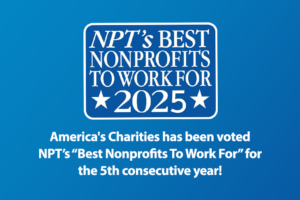charitiesadmin | November 3, 2010
Teach for America seeks foothold in Seattle area
Teach for America, the high-profile organization that steers recent college graduates into teaching, hopes to place 50 of its recruits into Puget Sound schools next fall — the organization’s first foray into Washington state since the mid-1990s.
The Federal Way School District has agreed to hire four to 10 Teach for America corps members — typically non-education majors who go into the classroom after five weeks of summer training. Seattle Public Schools is considering placing 20 to 25 more.
If Teach for America succeeds in getting a total of 50 placements in the next few months and raises a little more money, it will open operations here in September, and the Seattle area would become its 40th site across the nation.
The organization, which has grown tremendously since its beginnings 20 years ago, is in the middle of a major expansion effort, fueled in part by a recent $50 million grant from the federal government.
If Teach for America comes here, it won’t be without some controversy. It is perhaps the best-known path for minting new teachers outside of traditional teacher-preparation programs, and critics question whether it’s a worthwhile shortcut.
Washington state already has plenty of fully qualified teachers, they say, so there’s no need to bring in less-experienced people to fill jobs, especially those who commit to staying only two years.
“Why is it necessary at this time to bring in a different group of teachers who are trained for five weeks, have a two-year commitment and then, in a lot of cases, they are gone?” asked Glenn Bafia of the Seattle Education Association, the union for Seattle teachers.
The union, he said, does not support a proposal to bring the organization to Seattle, which will be discussed at a Seattle School Board meeting Wednesday.
But Teach for America also has supporters, who praise its success in attracting top college graduates into a profession most wouldn’t have pursued on their own.
The organization says one-third of its alumni keep teaching after two years, and two out of three remain in the field, some in higher education, others as public-policy analysts or school administrators. It also points to studies that show Teach for America teachers are at least as effective as those who enter the teaching profession in more traditional ways.
School districts say Teach for America is one way to attract good teachers, especially people who might not be able to afford the tuition and time that a traditional program requires.
Washington state already has a handful of other programs that allow people to become teachers in nontraditional ways. But Teach for America would be a significant new presence — adding 50 people to the 120 to 200 each year who complete other alternative preparation programs in this state.
Federal Way Assistant Superintendent Sally McLean said her district is excited about Teach for America’s ability to recruit at so many more colleges than Federal Way could do on its own.
In Seattle, district leaders say they’re impressed with Teach for America’s track record. “We’ve had strong applicant pools in the past. We just think that having Teach for America candidates will broaden and deepen the pool,” said Holly Ferguson, director of policy and government relations.
But unlike Federal Way, Seattle isn’t willing to hold any spots for Teach for America members. Under its proposed agreement, Teach for America recruits would compete with other applicants for Seattle jobs open to outside candidates.
Targeting ethnic gap
Teach for America was started in 1990 by Wendy Kopp, then a young college graduate, and has grown steadily. Its overall goal is to help eliminate the gap in achievement between ethnic groups, and it wants its members to work in low-income communities. It also provides mentors who track the young teachers’ progress closely.
The organization recruits mostly on college campuses. Last year, it received 46,000 applications for 4,500 spots. The University of Washington is one of its top sources of applicants.
Participants earn the same salary as any first-year teacher, and live by all the rules other teachers do. As they teach, they also study nights and weekends to earn a permanent teaching certificate.
Its 20,000 alumni include big names in education, such as Michelle Rhee, the former chancellor of schools in Washington, D.C., who has been on the cover of Time magazine.
UW dean among alumni
In Washington state, about 50 Teach for America alumni work in schools and colleges, including 33 teachers, a few principals and Tom Stritikus, new dean of the UW’s College of Education.
Stritikus says he supports alternative paths such as Teach for America “because I think they breed innovation.”
Teach for America operated in Seattle for two years back in the mid-1990s, with 17 young teachers, but withdrew when it faced funding problems and Seattle was laying off teachers. Now it wants to come back.
It hopes to begin recruiting for Seattle-area positions in January. Before then, however, it says it must sign agreements to place at least 50 corps members in local school districts, have enough money to cover three years of expenses, and find a university partner to provide the training participants need to earn permanent teaching certificates.
So far, the organization has raised about $4.1 million — about 80 percent of its estimated startup costs — from donors such as the Seattle Foundation, the Bill & Melinda Gates Foundation, the Raikes Foundation and the Bezos Family Foundation.
Signing agreements with school districts will be the biggest challenge, since most school districts expect to cut expenses again this year. And the job market for new teachers isn’t brisk — only about a quarter of those who earned teaching certificates last school year in Washington state landed teaching jobs, according to the Professional Educator Standards Board.
But Teach for America is hopeful that it will find enough districts like Federal Way that want to include Teach or America as one source of new teachers.
The program isn’t free to districts. Federal Way, which signed its agreement last year, will pay a $3,000-per-teacher fee. Seattle Public Schools would seek outside funding to cover the charge — now up to $4,000 per teacher — which is another contingency in its proposed agreement.
Teach for America is willing to accept Seattle’s conditions, even though it’s a risk, said Janis Ortega, Teach for America’s managing director for new-site development. But she hopes that, if the agreement is approved, Seattle will soon make Teach for America a regular part of its budget.
Despite their reluctance to commit, Seattle administrators say they are confident they would have places for 20 to 25 Teach for America teachers.
“We believe strongly that there will be positions open in our schools, because there always are,” Ferguson said.
Get Resources and Insights Straight To Your Inbox
Explore More Articles
For Fifth Consecutive Year America’s Charities Named ‘Best Nonprofit To Work For’
Washington, D.C. – April 1, 2025 – America’s Charities, the nonprofit that mobilizes the power of giving as a leading provider of volunteering, workplace giving,…
Read ArticleWorkplace Fundraising + Volunteering Summit (April 2nd and 3rd, 2025)
Join us in attending this virtual summit! The America’s Charities team is joining up with other leading voices in the workplace giving space for a…
Read ArticleThe Time to Act is Now
The results of the 2024 National Assessment of Educational Progress (NAEP) are in, and the findings are, in a word, heartbreaking. This assessment serves as…
Read ArticleGet Resources and Insights Straight To Your Inbox
Receive our monthly/bi-monthly newsletter filled with information about causes, nonprofit impact, and topics important for corporate social responsibility and employee engagement professionals, including disaster response, workplace giving, matching gifts, employee assistance funds, volunteering, scholarship award program management, grantmaking, and other philanthropic initiatives.




